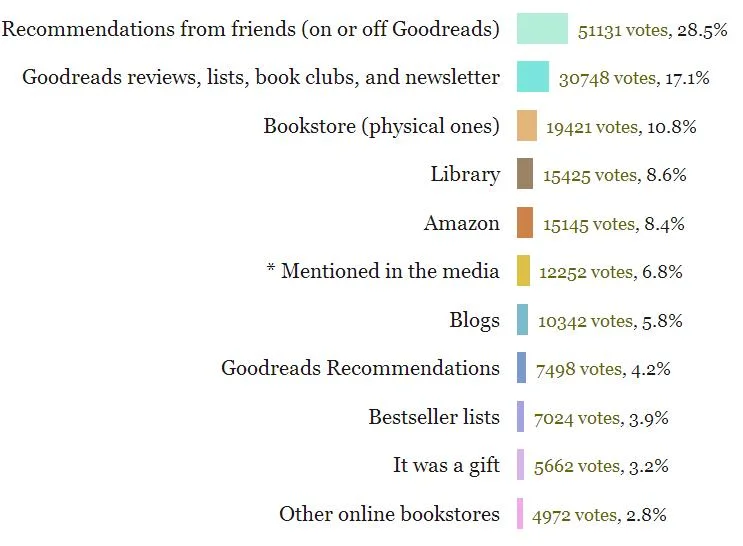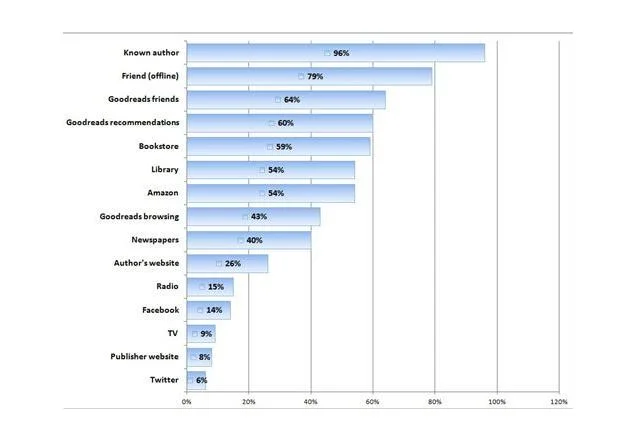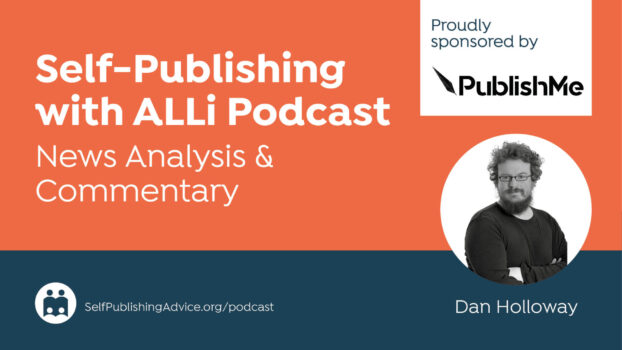It's all very well for self-published authors to talk about reaching readers, but how do you find the readers you need to reach? British author James Minter, who lives and write in France, turns this question on its head and considers how readers discovers books, to help you home in on your ideal target readers.
 Where or how people discover books is close to every indie author’s heart. Without discovery, there are no readers, no appreciation of the investment you’ve made to craft your masterpiece; no one will know your grasp of language, your eloquent prose, the sweat and tears, the long hours and the gallons of coffee/wine consumed to bring it to fruition. Hopefully this post will enable you, as author, to better target your marketing efforts to find the elusive Holy Grail you seek.
Where or how people discover books is close to every indie author’s heart. Without discovery, there are no readers, no appreciation of the investment you’ve made to craft your masterpiece; no one will know your grasp of language, your eloquent prose, the sweat and tears, the long hours and the gallons of coffee/wine consumed to bring it to fruition. Hopefully this post will enable you, as author, to better target your marketing efforts to find the elusive Holy Grail you seek.
Here are the results of a Goodreads Featured Poll which is currently running on the https://www.goodreads.com/poll/show/60770 website:
Each Goodreads member may vote only once and for only one of the 11 categories. I mention these two facts to emphasise the significance of this poll. At the time I'm writing this article, around 180,000 readers had voted. As polls go, this is a very credible number of responses. As indie authors/self-publishers, we should take note of this when designing our marketing strategies. Because it’s a Goodreads poll, it's not representative of all the people you may wish to target, but by definition, they are serious readers, so this surely has to be a good starting point. If you aren’t already on Goodreads you know what to do next …
Detailed Analysis of Readers
Looking at the figures in more detail, 28.5% – the highest percentage – say they found their last book to read through recommendations from friends. People trust other people’s opinions. So your existing readers are your best sales people, (or not, if you’ve written something below par or outside their taste span).
This means we need to care about our readers – I’m sure you do – and not take them for granted. The sample includes recommendations from outside Goodreads, again a significant point to note because this survey was completed by Goodreads members, so you would expect the site to feature prominently. But the question is phrased to be inclusive, on or off GoodReads, which drives home the point about the word-of-mouth aspect of getting you and your books known. Personally I've sold more books pressing the flesh following presentations, say, than through any other means. As a caveat, my target audience are the more mature adult who are less PC/internet/social networking savvy, and more old school. They like physical books.
The second significant category – Goodreads reviews, lists, book clubs and newsletters – is a bit of a catchall and accounts for 17%, but it does highlight the importance of reviews to authors, as well as the role of book clubs in getting your books known.
The third category is physical bookstores. People like to browse the shelves and are drawn by covers, the back cover blurb and the author. Thus I think it legitimate to bundle it with the libraries category, since they offer a similar experience. Combined, they represent nearly a fifth of the way books are discovered. For me, this is heartening since the demographics suggest most visitors to high street bookshops and libraries are by 40+ group, as this Random House infographic from June 2013 suggests. Although the role of libraries has changed, in the UK alone there were 306 million library visits in 2012.
The next category is Amazon – 8% of responses – but for one organisation, this is significant and says to me you’ve got to be on here and keep your author profile up to date, relevant and interesting. My second-pronged approach to Amazon is to develop my reviewer status. I review books and products, read other reviews, and respond by confirming whether a review was helpful or not, and I leave comments.
The remaining six categories – media, blogs, Goodreads recommendations, bestseller lists, gift and non-Amazon on-line stores, account for 23% of book discovery. On these, my observations are:
- national media is difficult for indie authors to get into
- bestseller lists we can only aim for
- gifts – I give books all the time to friends and family
- all the other on-line stores – if you’re looking to reduce the time you spend on marketing, consider giving up these sites, as the effort may not yield the return you want
Of particular note in this group of categories is Goodreads recommendations. Does this say from the first category above, the recommendations from friends on GoodReads is the major source of discovery? In a Goodreads blog post by Patrick Brown, Director of Author Marketing in December 2012, he noted that 79% of new books are discovered from friends offline:
Unfortunately, “known author”, the biggest category of in Patrick Brown’s analysis above, isn’t included in the GoodReads Poll. ‘Known Author’ tells us that readers tend to go with what they know, the safe option maybe, and are less likely to try someone new. The difficult thing for self-published authors is to achieve fame in the first place? How do you do this?All suggestions welcome, via the comments section below!
Like to share these findings and questions with other author friends? Here's our suggested tweet:
“How readers discover books & how to gain #discoverability for yours: https://selfpublishingadvice.org/reaching-readers-how-readers-discover-books/ via @james_minter & @IndieAuthorAlli”







[…] Reaching Readers: How Readers Discover Books […]
[…] Reaching Readers: How Readers Discover Books […]
[…] How they shop is also a useful piece of information. Find out how people find books here. […]
I think what Orna said about a “relevant blog post” is very germane. To get known, you need to figure who has the audience you want, network with those people, and then see if you can get them to review your work or let you guest post on their blog or website. And writing well for the web is a very big skill that shouldn’t be overlooked by indie writers IMHO.
Even if the research isn’t scientific, a great post nonetheless.
(And so great to happen upon another Butcher on this comment thread!)
Amy
Amy, thanks for sharing your thoughts and the complement on the post …
I am only at the starting post of marketing my book so this is all useful information – thanks for sharing. I am finding friend recommendation to be the most effective method of people picking up my book at the moment but it all takes so long as it requires others to have read it first. You can only hope that there is a ripple effect being created there somewhere! I’ve also been surprised by how few people leave reviews though I have found engagement with other readers who have taken the time to feedback to me direct which is always wonderful.
I have also made sure that I encourage all to read it as I found it has been read by people I would not have considered as being in my target audience and rave reviews have appeared – you can just never tell!
Looks like a comprehensive strategy which I guess it works for you. In truth there is no silver bullet and each author is different so not too surprisingly, each approach to market is different. Whats great about belonging to Alli is that we all get to hear about the different approaches and can cherry pick.
For me, I’ve found it useful to not try to reach all readers. Instead, I focus on the niche most relevant to my books. I try to do well in a small pond, instead of being invisible in a big one. I found Let’s Get Visible (by Gaughren, I never can remember how to spell his name) very helpful in learning to leverage keywords and such. I also learned a lot about metadata and keywords from the Self Publishing Roundtable.
I also try to use my blog to connect with people who may not call themselves readers, but will pick up a book from someone they like.
Mostly I a) think a lot about how I find books and try to leverage ways to be visible in those ways and b) I work within my comfort zone. I don’t like hard selling, so I also use my blog as a soft selling venue. I either talk indirectly about my books or I just mention one below the post. I only mention my books on social media when I have something new to say.
While I offer print editions of some of my books (most are available used), I make most of my money with digital books. I also post my books everywhere I can, because I want to be where people buy books. 🙂
I’m fairly new to Goodreads, and although I’ve ‘found’ a couple of good reads through a f friend’s recommendation on there, I’m disappointed with the selections it offers to members in terms of ‘what I might l like’ (they get it really wrong, and they insist on offering classics because I’ve ticked the ones I read at school!!) and also in the relative NON-ease of finding one’s way around – I give up for lack of time to spend wandering on the site sometimes!
I also know that a couple of people gave my book Baby, Baby a Goodreads review – I’ve read them – but Goodreads say ‘no reviews’ of it, and I certainly can’t find those reviews now.
My suspicion is Goodreads may be too big for itself and needs to re-design the maze so we can use it more effectively as authors and as readers?
With regards to GoodReads and redesign the maze I’m with you on that. not the most intuitive site to use…
I tried to get a review of my book on Goodreads. The lady said she would but had twelve books to read over the weekend. I thought to myself, no way do I want someone reviewing my YA fantasy fiction book at a speed faster than I could watch twelve movies over a weekend. I had hoped to find a pleasure reader not someone performing the impossible. I turned down the offer and this upset her attitude. I would not want a review from anyone who reads only to move on to the next book in a hurry to get it done. It seems like people like her think they are publishers instead of readers.
but this is just votes from members of Goodreads: not very convincing
Absolutely but as a free, uptodate guide it ant bad. Don’t remortgage your house on the strength of this but its better then p..sing in the wind to use the vernacular.
There is definitely some value in this poll, but as a former director of sampling for a major survey research firm, I do have to point out that it has a shaky foundation. The sampling method used unfortunately means this is not generally applicable, and everyone need to take care about drawing any inferences.
Also, the statement about the number of responses is a little disconcerting. Above a certain minimum, the overall volume of responses does not add much statistical validity. The reason that most of the political polls you see on TV have 1-5,000 responses from (“likely voters”) is because that’s a very good sample size for most studies.
What matters is not the size of the population of study but how varied a group it is. Small, highly variable populations need LARGER sample sizes than huge, monotonous ones to give the same level of confidence in the survey responses.
Everyone needs to evaluate how well the population covered by this study overlaps with their target audience, and weight these results up or down accordingly. (And unfortunately, nothing much can be done about the opt-in approach, which is total trash.)
tldr; this is poor survey research, but it does have some anecdotal value if handled correctly.
Where does advertising through venues like Bookbub, ENT, BB, FK, BooksontheKnob, ect fall in the list?
Because whoever compiled the questionnaire never thought of it I guess.
Thanks for the data and the detailed analysis.
I need more friends!
The problem, even with the friends I already have, is that, for someone to recommend a book, that someone usually has to have read and liked the book.
I was such a voracious reader as a child that no one in my life could have recommended books fast enough for me, so I never learned to rely on recommendations – so I don’t think of them now, when the publication date for my first novel is (I hope!) approaching fast.
So thank you for pointing out how important a recommendation is. I knew it was important – but hadn’t realized it is THE most important.
Alicia
Thanks James, great analysis! I agree about Goodreads being a great resource. We are going to be improving ALLi members’ presence there shortly. On national media, it’s our experience that it’s good for name recognition but doesn’t move the needle very much on sales instantly, as a relevant blog post or online review can. Great thought provoking post.